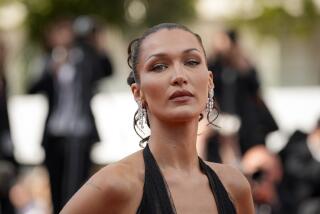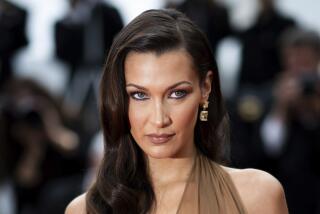This Bud’s for Bora : Bucking Protocol, World Cup Soccer Coach Will Hawk Beer
- Share via
When the Super Bowl of soccer--the 1994 World Cup--is aired next summer, the charismatic head coach of America’s World Cup team, Bora Milutinovic, will star in Spanish-language TV and print ads promoting Budweiser beer.
And that has some critics raising sharp protests.
After all, consumers would never see an active National Football league coach hawking beer. The NFL forbids current coaches or players from appearing in ads for alcoholic beverages--except those that promote responsible drinking. So does Major League Baseball, the National Basketball Assn. and the National Hockey League. What’s more, federal regulations--and self-imposed beer industry guidelines--have historically been interpreted as prohibiting active athletes as well as coaches from appearing in beer ads.
But with Budweiser sales declining in recent years, some consumer activists suggest the move is one of desperation by brewer Anheuser-Busch. The 1993 Maxwell Consumer Report, a highly regarded monitor of the food, beverage and tobacco industries, reports that Budweiser’s market share has dropped for five consecutive years. It plummeted 3.1% in 1993 to 23.4%.
That has left the brewer scrambling for new markets, such as Latinos. Even the government bureau that oversees ad regulations for alcoholic beverages says that with this campaign, Anheuser-Busch appears to be ignoring federal regulations.
“I can’t believe Anheuser-Busch plans to commit millions of dollars to this campaign,” said Les Stanford, information officer at the Washington-based Bureau of Alcohol, Tobacco and Firearms. The spots are scheduled to be filmed sometime this month.
“I don’t recall any ads with active coaches promoting beer, and there’s a good reason for it,” Stanford said.
“If you’re a coach pushing an alcoholic beverage, well, we look at it the same as if you’re a player. That’s a no-no,” he said, referring to “false or misleading” ad practices prohibited by the Federal Alcohol Administration Act of 1935.
In the early 1950s, the bureau specifically ruled against the use of active athletes in alcoholic beverage advertisements, saying such ads imply that alcohol somehow contributes to athletic skills.
The big beer makers have a long history of trying to link their images with athletes and coaches. During this year’s Super Bowl, for example, Budweiser will broadcast several beer ads featuring Mike Ditka, former head coach of the Chicago Bears, and Bum Phillips, former head coach of the Houston Oilers.
At the same time, Pat Riley, now head coach of the New York Knicks and former Los Angeles Lakers coach, is in the midst of a multiyear contract as a spokesman for Miller Brewing Co.’s “Think When You Drink” campaign. Similarly, Miami Dolphin quarterback Dan Marino has been a paid spokesman for Anheuser-Busch’s “Know When to Say When” campaign.
And in the 1988 Winter Olympic Games, the U.S. Ice Hockey Team briefly sold ad space on the hockey players’ helmets to Budweiser, which pasted “Bud” on the sides of the helmets. After consumer complaints and objections from Olympic officials, the logos were removed.
Several consumer groups are particularly unhappy with Budweiser’s latest proposal to feature the head coach of the U.S. Soccer Team.
“This is irresponsible and shows a lack of concern for the Hispanic population and its youth,” said Jane Delgado, president and chief executive of the National Coalition of Hispanic Health & Human Services Organizations, a Latino consumer group in Washington. “It’s using a respected figure to promote a product that’s clearly not for youth. I guess it’s a free-for-all out there and all people care about is market share.”
She said she hopes the ads never run.
Equally outspoken is Peggy Charren, co-founder of the consumer group Action for Children’s Television. “The World Cup is one of the few programs you wouldn’t want to turn off when your kids are watching,” she said. “But here’s a beer salesman who would be very attractive to kids. Kids will trust this guy.”
Not only will kids trust him, but they will probably be inclined to want to drink his brand of beer, said Sarah Kayson, director of public policy at the Washington-based National Council on Alcoholism and Drug Dependence. “This is one message that we don’t think should be sent to kids.”
Milutinovic, the soccer coach who will star in the ads, conceded in a telephone interview that he doesn’t even drink Budweiser.
“I don’t drink beer. I don’t like it,” said Milutinovic, who is fluent in five languages, including English and Spanish. “I drink 7-Up.”
Milutinovic is widely regarded for coaching the Mexican national team to sixth place in the 1986 World Cup held in Mexico, and for coaching the 1990 Costa Rican team that surprised many fans by qualifying for the second round of the World Cup in Italy. The team he now coaches, Team USA, also surprised the soccer world with a 2-0 win over England in the 1993 U.S. Cup.
Milutinovic said he doesn’t think there is anything wrong with him appearing in ads for Anheuser-Busch, “because they’ve helped the sport of soccer so much.”
Indeed, Anheuser-Busch has sponsored soccer events in the United States for 15 years, including televised sponsorship of the past two World Cups. And it is a so-called marketing partner with the upcoming World Cup, which is hoping to whet American interest in soccer by holding the finals in the United States this year for the first time.
The final game is scheduled at the Rose Bowl on June 17. It is expected to be seen by an estimated 2 billion viewers worldwide--nearly twice the audience of the Super Bowl.
Executives at Anheuser-Busch, which has paid an estimated $3.5 million to be the exclusive beer sponsor of World Cup soccer, insist there is nothing wrong--legally or morally--with using Milutinovic in its Budweiser ads.
“You won’t see Bora holding a Bud and saying, ‘When I drink beer, I drink Bud,’ ” said Alejandro Ruelas, senior manager of ethnic marketing at Anheuser-Busch. “Every piece of work we’re doing is being done with the best interest of the game at heart.”
“We certainly have sensitivity about any advertising that might undermine the millions of dollars we’re spending to discourage underage drinking,” said Joe Castellano, vice president of consumer awareness and education at Anheuser-Busch. The Milutinovic campaign, he said, was a “no brainer” because the World Cup “is clearly an adult-oriented event.”
What’s more, Castellano said, Anheuser-Busch believes the federal regulations that prohibit active athletes from appearing in beer ads do not bar active coaches. The bureau has “never construed (the use of) coaches as a violation,” he said.
Nor does the Beer Institute, the Washington-based beer industry lobby, see anything wrong with the proposed campaign.
“If you look at (Milutinovic) as a role model, it can send a positive message to the Hispanic community,” said Jeff Becker, vice president of alcohol issues. “On the one hand, you have some people asking you to be more inclusive in your advertising, and on the other hand, you have others who will say, ‘That’s a bad idea’ to anything you do.”
Senior executives with World Cup ’94 say they have no problems with the relationship between Anheuser-Busch and Milutinovic.
“Everything (Anheuser-Busch) has done has been in very good taste,” said Lester Wintz, senior vice president of external affairs at World Cup USA ’94. “I have no concerns.”
But one sports marketing expert suggested that the World Cup is simply bending to the pressure of a major sponsor.
“I’m sure the World Cup committee wrestled with this one,” said Martin Blackman, a New York-based sports marketing consultant. “But put yourself in their shoes. Bud is giving you a lot of dough. So there might be hesitation on their part to say to Bud, ‘Back off.’ But I think they should have.”
Bud Loses Some Fizz Budweiser beer -- the best-selling beer in the United States--has seen its market share and sales fall for the last five years.
Budweiser market share: 23.4% (1993)
Budweiser sales (millions of barrels): 44.2 millions of barrels (1993) Source: Wheat, First Securities; Maxwell Consumer Report, Beverage Industry magazine


